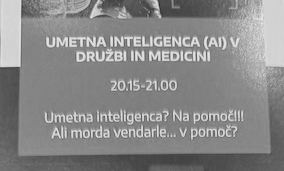AI in society and medicine
On 12 January 2024, the XIIIth MONS2024 Expert Meeting took place, organised by the Association for the Dissemination of Knowledge and Research in Medicine, led by Prof. Dr. Matjaž Bunc.
The final act of the meeting was a panel discussion entitled “Artificial Intelligence? Help!!! Or maybe… helpful?, with the participation of Dr Maja Bogataj Jančič. At the event, which was also attended by Marko Groblenik, IJS, and moderated by Igor E. Bergant, she highlighted the benefits of artificial intelligence and warned of the dangers. Especially in the field of radiology and diagnostics, AI can be very helpful. For example, already in 2016, a research project was carried out in collaboration between the UKC and the Faculty of Electronic Engineering Analysis of medical images with machine learning to predict the course of brain disease and the effectiveness of treatment. The project was led by Prof. Dr. Katarina Šurlan Popovič on the UKC side, and Prof. Dr. Franjo Pernuš and Assoc. Prof. Dr. Žiga Špiclin on the EF side. Artificial intelligence can be an extremely powerful tool and can be of great help to doctors, especially in making a diagnosis and determining the appropriate treatment. This is also the aim of the Slovenian TELEKAP project, which could increase the efficiency of neurologists and radiologists in the field of stroke treatment. Prof. Dr Katarina Šurlan Popović, who was present in the auditorium, pointed out that an American study and practice has shown that artificial intelligence can save up to 2 hours of time in treatment procedures, where the first hours are crucial, which is literally a matter of life and death.
Dr Maja Bogataj Jančič stressed the importance of data management in the processes of creating artificial intelligence and of respecting legal rules and ethical guidelines. It is crucial that researchers and experts who are creating artificial intelligence, which was also the case with the panellist Marek Grobelnik, who is a prominent expert in this field in Slovenia, are (better) aware of the importance of legal and ethical constraints in the initial processes of creating artificial intelligence. These include in particular issues of privacy protection, research ethics rules and, in some cases (less so in medicine), copyright issues. She also pointed out that it is the neglect of these issues that could jeopardise the development of AI. As an example, she highlighted ChatGTP, which was launched at a stage where it is still working quite poorly, but is being replicated as a mass-market product. She highlighted the important lawsuit brought by the New York Times against OpenAI and critically pointed out that, because of OpenAI’s approach to these issues, there may now be a situation where OpenAI will lose the lawsuit and, as a consequence, the entertainment industry will control the creation of artificial intelligence in all fields, even those as useful as medicine. She pointed out that the EU regulates the field differently, distinguishing between cases where research is involved and cases where commercial AI is involved.
Recordings and presentations from all speakers at the ERA KR21 Conference Slovenia are now available on the subpage “Recordings and PPTs of Presentations by Speakers“.
Open Data and Intellectual Property Institute ODIPI invites you to a discussion organized by the European Commission Representation in Slovenia titled “Democracy in the Grip of Disinformation: What Can the EU Do?”. The event will take place on Friday, December 13, 2024, from 11:00 to 12:30 at the House of the EU in Ljubljana, Slovenia and online.
Open Data and Intellectual Property Institute ODIPI organized the ERA KR21 Conference Slovenia on December 2, 2024, with the support of the Ministry of Higher Education, Science, and Innovation of the Republic of Slovenia and the Knowledge Rights 21 (KR21) program. The Conference focused on addressing the most pressing issues in copyright regulation in the fields of science and Open Science within the European Union (EU), with particular emphasis on barriers and incentives for Open Science in the copyright law. The event represented Slovenia’s contribution to implementing European Research Area (ERA) Policy Agenda Action 2, which focuses on creating a supportive EU legislative framework for copyright and data governance.
On Wednesday, December 4, 2024, the second day of the Global Partnership on Artificial Intelligence (GPAI) Summit 2024 took place at the Palace of Serbia in Belgrade. Dr. Maja Bogataj Jančič participated as a speaker, presenting during the panel titled “AI Regulation – what we learned so far?”.





